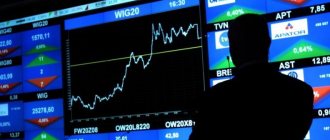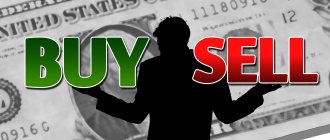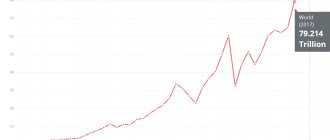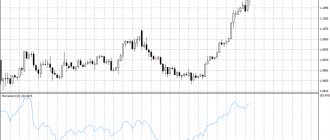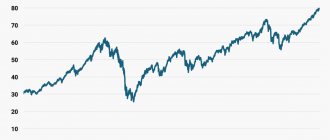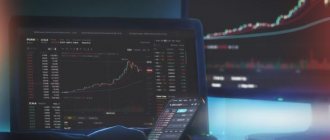My name is Nikolai. I am 32 years old. I'm married, but have no children yet. I live in a regional center in Siberia. I work for a well-known oil and gas company as an energy engineer on shift in the Far North. I have been working for a long time, so I have maximum northern experience and all northern allowances. The salary, taking into account all bonuses and allowances, averages about 200 thousand rubles per month.
Until February 2021, I lived like most Russians - I received a salary, spent it on everyday needs, entertainment and travel. Spent everything. All 200 thousand ₽ month after month... It was a fun time, of course. But in the “Assets” column I had 0. Absolutely nothing. There was a one-room apartment in which I lived, and there was a car. But as the famous personal finance guru Robert Kiyosaki says, these were all liabilities that took money out of my pocket - they don’t bring in money, but they incur maintenance and repair costs.
How much money should a beginning investor have and where to get it?
There is no set amount. Among brokers you can hear amounts starting from 100,000 rubles, but it is clear that this is a story for the passive behavior of the novice investor himself (that is, if you entrust capital management to a broker and do not make decisions on transactions yourself). If you decide to try to earn money on your own, then you can take the following minimums as a basis:
- “standard” minimum - 10,000 rubles
- IIS (individual investment account) - up to 400,000 rubles. in year
- for the purchase of domestic blue chips - 10,000 rubles.
- for the purchase of foreign products - highly depends on the selected assets
But, I repeat, these are conditional amounts: you can choose your own, sometimes the minimum amount of funds in the account is regulated by the broker with whom you will be serviced.
The main thing is to determine the important parameters of the funds that you are willing to invest.
- At the beginning of your investment practice, do not invest the latter; you should have a reserve of funds. One of my best practices is to save 10% of any income (left, right, awards and bonuses - that’s all, even gifts). If there is no goal of saving for something important, you can try part of this money in trading on the stock market.
- Do not take out a loan for investments (with the exception of leverage, special leverage from a broker) - you may lose the borrowed money rather than increase it. And if it’s a shame to lose your own, then it’s also scary to lose someone else’s.
- Be prepared to “free up” your funds for a period of about 3 years - sometimes this is due to the return of personal income tax, sometimes with the formation of a long-term low-risk portfolio, etc. Well, plus, you definitely won’t immediately find the most winning strategy for you.
Trading indices
The Moscow Exchange indices family includes:
- benchmark (trading indices RTS and Moscow Exchange);
- “blue chips” (previously 15, now 25 issuers: the liquidity of their securities is beyond doubt);
- trading index of mid- and small-cap stocks;
- trading index of broad market shares (top 100 shares of Russian companies).
Sectoral trade indices are formed from the last list. In addition, the Moscow Exchange uses thematic indices:
- public sector;
- innovation;
- Moscow Exchange index 10.
There are versions of indices that take into account dividend payments: so-called total return indices.
Prospects for investing in these indices
The Moscow Exchange ended the second quarter with good financial performance. The dynamics of quotes for trade indices went up. But this is the market. Advising anything, especially for the long term, is a thankless task.
There are prospects. I can only recommend the MFD financial portal: there is a lot of useful information there.
How to enter trading on the stock exchange?
Directly - no way. In the Russian Federation, individuals do not have the right to make independent investments in the stock market. To access the Moscow Exchange and other platforms, you need to enter into a brokerage service agreement and open a brokerage account. After this, you can entrust the management of your money to a professional stock market participant (large amounts) or start making transactions yourself (if the amounts are small).
- Working directly with a broker - you enter into an agreement, install trading platforms and start experimenting, based on your knowledge or (which is good, but risky) on discussions on forums of professional and amateur traders. This is the best option for beginners.
- QUIK is a set of tools for analysis and trading with extremely fast data updating. You can trade on Russian and foreign stock markets. Secure due to data encryption.
MetaTrader5 is a program for trading instruments of the futures, foreign exchange and stock markets. Allows you to create custom reports and trading algorithms in the MQL5 programming language.
Reviews
How the Moscow Exchange works, according to reviews from employees and traders.
Employees
Here are screenshots of reviews about the employer.
Traders
Feedback from traders will complete the picture.
How to trade?
There are many strategies for trading in the stock market, but not all of them are suitable for beginners.
Let's look at the main ones. Scalping is a popular type of trading in which a trader makes a profit from any price movement. This is work on short time frames (sometimes even 5 minutes or a minute). Suitable for those for whom trading is their main job (profession) and requires concentration and attention to detail.
Fundamental trading is a type of trading in which a trader trades over the medium term using fundamental analysis. He analyzes and forecasts market movements and the totality of indicators of issuers of securities in the portfolio and, based on the conclusions received, makes transactions. This is a rather conservative trading method, it is quite suitable for beginners who start with fundamental analysis.
Technical trading - a trader trades on any time frames based on technical analysis. Transactions are closed not on the basis of information about the market and the issuer, but on the basis of forecasts of price changes based on how they changed in similar external conditions. Essentially, this is trading based on trend analysis. Suitable for more experienced traders, but already at the training stage it is worth starting to master the basics of technical analysis.
Another strategy suitable for beginners is medium-term trading. The operating principles are the same as scalping, but profit or loss is fixed based on price movements in the medium term (an hour, several hours, a day). This time is enough to conduct an in-depth analysis and make a decision or decide on a strategy. A very stable and comfortable trading method.
High-frequency trading (if you've been on Habré for a long time, you've probably read about it) is trading where traders are computers that perform millions of computational operations per second in order to get maximum profit. It is interesting, promising, and even more relevant for programmers, but you need to know that it is unsafe, requires knowledge and trading experience, and can also be attacked or blocked. It is not yet completely clear whether HF trading is the future of the entire global trading system, but it definitely has prospects.
Well, two types of trading are used exclusively by professionals and large institutional market participants.
Instant trading is trading based on price movements within different time frames.
Trading on long-term timeframes is trading based on a set of enlarged economic processes, external factors, market conditions and trends.
There is another trading strategy - repeating other people's actions in your strategy - will not lead you to professionalism and will not allow you to build competent relationships with the stock market. Reading stories like this is interesting and informative, but building your trading solely on copying is a very bad idea.
You can always test the chosen strategy “in the laboratory” using historical data and calculate what result you could get. This is additional “training” for your analytical skills.
So, you have become familiar with the types of trading and...
Next, I recommend that you read the blogs of large brokers (but remember that they are sometimes written not by professional financial copywriters or experienced traders, but by marketers with a philology background, so maximum criticality!), watch educational materials (you can even use basic university textbooks), go online -courses from well-known companies (for example, I like the free school for beginners Investments 101 from BKS; it is the most balanced of Russian-language materials). There is another way - to hire a teacher on stock exchange business from former traders or from a university; in a short time they will clearly explain the basics to you. But don't hesitate to ask about practical experience.
Throughout your training, you will need a demo account, where you can operate with virtual money and not incur a real loss (however, not make a real profit). (By the way, please note that the demo account should not inspire you, because, firstly, it is greatly simplified relative to the real situation, and secondly, it can motivate you and “play along”).
And now, when you are armed to the teeth with the basic theory and you know that Japanese candles are not sold on Aliexpress and do not fit Toyota and Honda, you can try to start working with real money on a brokerage account.
No, stop. I don’t want to seem like a home-grown psychologist, but I know from myself: be prepared that you are not the wolf of Wall Street. No confidence, no relaxation, no excitement. You are an inexperienced sapper in a minefield without a mine map. This means maximum rationalism, reasoning and caution.
Well, that's it, let's start.
You need a broker, or rather, an organization where you can open a brokerage account. The broker will provide you with access to trading instruments and will assume all technical and legal risks. The broker performs all actions on your behalf and at your expense (unless otherwise agreed), and you, as a trader, make decisions about what assets to purchase, how to build a portfolio, etc. If desired (often with a certain set volume of investment), you may be provided with a personal broker with whom you can consult via chat or by phone about some risky transactions, structured products, access to certain instruments, etc.
How to choose a broker?
A professional participant in the securities market who carries out brokerage activities is called a broker. This is a company that has access to stock market trading platforms and will make trades on your behalf and for your account. In addition, the broker is a tax agent and it is he who will properly prepare and submit tax returns or issue a tax deduction. The money will arrive in your account already “cleared” of taxes. For its activities, the broker takes a commission - as a rule, this is a very small amount, but the guarantees and convenience are at a high level.
- First and foremost, your broker or forex dealer must have a license from the Central Bank of the Russian Federation. You can check it in the current registers on the Bank’s website. If you are told that the license is about to be updated or is being updated, refuse to deal with such a company.
- Brokerage accounts of well-known banks deserve trust. Sberbank, VTB, Alfa-Bank, Tinkoff Bank and others have investment offers. They differ in capabilities, minimum conditions, set of tools and accessibility.
- The broker must not only conclude an agreement on a brokerage account, but also tell you about all the tools and provide access to desktop and mobile applications necessary for investment activities.
- Even if you are going to invest passively (entrust capital management to a broker), you should have tools to control and monitor the status of your accounts, you can see the details of all deals and transactions.
- I recommend that you pay attention to foreign brokers, for example, one of the popular options with at least some Russian-language support is Interactive Brokers. It is distinguished by trading programs with a huge number of functions and analytical capabilities.
- Additional insurance – the duration of the company’s activity on the market. If it has been valid for more than 3 years, as a rule, the company can be trusted.
Despite the fact that the market for financial institutions is strictly regulated, new fraudulent companies constantly appear that pretend to be brokers.
They collect money from potential investors and then disappear without fulfilling any obligations. At the same time, they offer convincing and “geeky” arguments: “we have neural networks,” “we work with Bitcoin, so we don’t get a license,” “we are for high-frequency trading,” etc. in fact, there is no question of any technology of scammers. Be careful. There is no need to confuse a broker with analysts, and especially with robo-advisers. If a broker has a lot of obligations under the contract, then these entities do not bear any responsibility for their advice and recommendations. However, any brokerage company has entire analytical services that provide brokers with a basis for decision-making and data for analysis.
How to build a portfolio?
There are three main investment parameters: profitability, investment period and risk. Accordingly, each portfolio is determined by the relationship between these factors. Here, as in the old joke: choose any two. In the chart you can see the ratio for different types of investors.
I think the most optimal ratio for investing: diversify - invest at least 40% in reliable instruments, 10% in high-risk instruments, distribute the remaining 50% based on liquidity and your main strategy. The optimal investment period is up to three years (including due to tax laws). The easiest option to start is to open an IIS (individual investment account, we will talk about it later).
How to lose money with a guarantee?
Most beginners in private investing make the same typical mistakes, which differ only in the scale of losses. Don't do this.
- Don't trade for luck or chance. Every action you take must be thoughtful and informed - and most importantly, based on data and analytics. For example, you saw signs of growth in Gazprom shares and decided to “dump” your stake amid the growth, and the next day they grew by 40%. Why? Because the market was waiting for the release of positive financial reports and increased dividends - the reports were released, growth began. You correctly read the market signal, but did not make a profit because you were in a hurry. And for an experienced investor, the state of affairs in the issuing company and information about all events is the most important tool. Even if you cannot give an accurate forecast and in-depth explanation of market processes, you should at least know what trends are worth selling, buying or holding assets in your investment portfolio.
- Don’t expect instant fabulous profits - you can’t “trade for 10,000 and withdraw 100,000 in a week” (even to scammers). Depending on the investment strategy, profitability is formed, which can also be negative. “Fabulous” profits can be the result of a risky investment by an experienced investor, but this is often just a matter of chance, because the results of high-risk investments are poorly predicted.
- Quitting your job to become an investor is the worst thing that can happen to a newbie. The path from the first thought to an experienced broker can take 3 years, or 5 years of fairly intensive training. I will speak directly from my experience: even after 3 years of specialization in financial mathematics, securities management and stock exchange business at a university, the only thing you can do professionally and reliably is to recognize scammers. “Making money” on the stock exchange does not work; you need additional training and practice. Again, basically, brokers who work with client accounts are employees of financial organizations and, in addition to commission payments, have a salary and, if necessary, can easily move horizontally to analytics or training. If you give up everything, install QUIK, connect your account and start “playing on the stock market”, get ready to eat little, dress poorly and save a lot. The conclusion is simple: either trading in the stock market is a source of additional income and an intellectual hobby for you, or you are consciously learning and changing your profession. And yes, trading on the stock exchange is not a game, it is work, even for a private investor.
- There are no mistakes worse than the previous point, but a confident second place goes to using the money you need now or in the near future for your first steps in the stock market. For example, if you are saving for a mortgage, a car or any other large and necessary purchase, and suddenly decide to quickly “save up”, leave this idea - the risk is too high. But if you have a “box” where you save your free funds and you are sure that you will not need the money in the near future (I recommend considering an investment period of 3 years), you can safely try your hand at increasing capital through a brokerage account. But remember - you may not only not receive additional profit, but also lose the principal amount of your investment.
- Don't mess with virtual currency.
The next two mistakes relate directly to the choice of investment instruments and they are two extremes of investment behavior.
- It is a mistake to use only one investment instrument (for example, invest only in shares of one company, only in dollars, only in gold, etc.). More precisely, in this case, you do not get active investment, but a rather conservative tool for “saving” money, which can bring income in the long term. This type of investment can be compared in efficiency to a bank deposit.
- It is no less a mistake to invest in everything, especially in risky instruments, obscure startups, new companies, in shares against the backdrop of hype around some events. This attitude towards your portfolio leads to a loss of profitability and a lack of understanding of the basics of structural investments. Ultimately, you may find yourself in a situation where you simply cannot predict the behavior of market participants and the market's reaction to them.
Here is this tweet
I am selling almost all physical possessions. Will own no house.
— Elon Musk (@elonmusk) May 1, 2020
caused this movement:
So predict your portfolio based on Twitter (by the way, an excellent way - there is already an understanding that the tweets of corporate CEOs, and even more so of politicians, and in particular D. Trump, actively influence stock market trends)
You know, what indicates that you have approached working in the stock market right? You must be bored. Excitement in investments (any kind!) is the worst advisor.
We choose the stock market for various reasons: out of interest, for investing and saving free funds, out of a desire to earn money, or simply to learn something new. Some developers, after getting acquainted with the stock market, change their specialization and go into the development of trading robots.
The stock market is a complicated story. In reality, no one can consistently successfully predict the future of the stock market: today you will hit the mark, and tomorrow other investors (that’s why this is speculative trading - in the good sense of the word). This, of course, is not roulette or a slot machine, but the whole difficulty lies in identifying the trend and learning how to do technical and fundamental analysis. Everything else is based on this. And programmers, mathematicians, and technicians are often good at analyzing trends, but to say from day one “I’m an expert in economics” is too arrogant and can turn against you. Remember: there is always a risk.
Who is more profitable to be: a speculator or an investor?
There is no clear answer to this question. Being a speculator is definitely more difficult. At any moment he can earn hundreds of thousands and immediately go negative. Plus, a speculator must know and understand the market in which he trades. And have such qualities as resistance to stress, a cool mind and a good reaction. A speculator's earnings can be called neither stable nor passive.
An investor's income is more predictable and regular (as is his life). Compared to a speculator, his potential gains and losses are much more modest. You can be an investor “part-time” without devoting all your free time to it. Necessary character qualities: patience, analytical mind and determination.
As for the answer to the most important question of the article: “Is it really possible to make money on the stock exchange?” — read my blog and see everything with your own eyes, and in real time!

